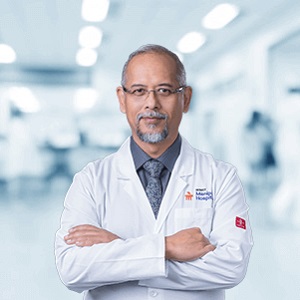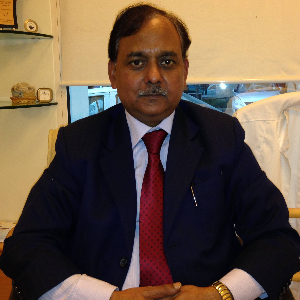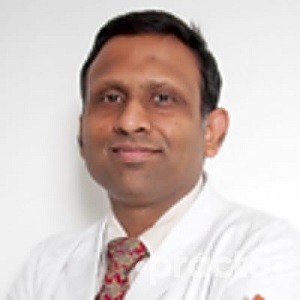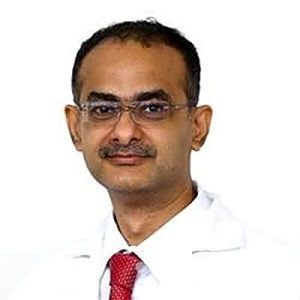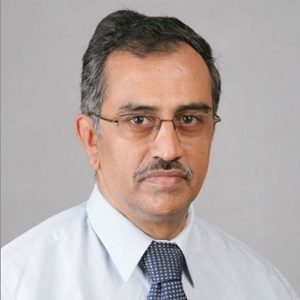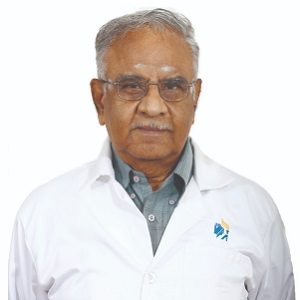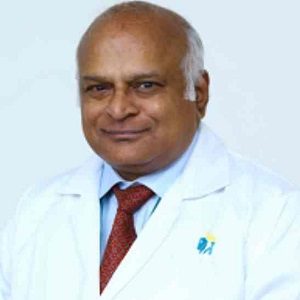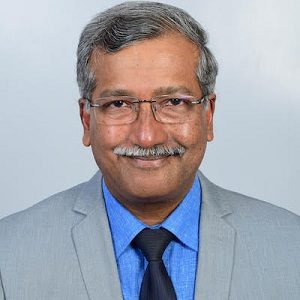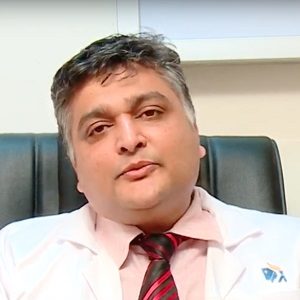Best Doctors in India for Vasectomy Reversal
- Urologist, New Delhi, India
- Over 20 years’ experience
Profile Highlights:
- Dr. Sanjay Gogoi is a renowned Urologist with over 20 years of experience, He is an expert in minimally invasive transplant techniques of Laparoscopic and Robotic-Assisted Transplantation.
- He is also trained in Robotic surgery at da Vinci Training Center, Intuitive Surgical, California. With over six years of experience in doing Robotic Cancer surgeries on the Kidney, Bladder, Prostate, Adrenal, etc., Dr. Sanjay Gogoi is an expert in Robotic reconstructive procedures of kidneys, ureters, and bladder, as well, as in adults as well as pediatric patients.
- Urologist, New Delhi, India
- Over 35 years’ experience
Profile Highlights:
- Dr. Anant Kumar is one of the finest urology and kidney transplant doctors in India.
- Dr. Kumar specializes in Kidney Transplantation, Robotic Assisted Laparoscopic Urology, Renovascular Hypertension, Laparoscopic Urology, Urological Oncology, Laser Urological Surgery, and Reconstructive Urology.
- He has performed over 3500 kidney transplants and over 2000 lap donor nephrectomy procedures over the span of 3 decades.
- Nephrologist, Gurugram, India
- Over 15 years’ experience
Profile Highlights:
- Known as one of the best nephrologists in the NCR region, Dr. Manish Jain holds a special interest in renal transplants as well as clinical nephrology.
- His compassionate patient care and lifestyle advocacy have helped patients recover from various disorders.
- Throughout his career, Dr. Manish Jain has published several papers in India and is also a member of several medical associations.
- Urologist, Chennai, India
- Over 15 years’ experience
Profile Highlights:
- Dr. Deepak Raghavan is a renowned urologist who has gained immense fame and praise in the few years of his career.
- He is specially trained in Robotic Surgery, the need of the hour for Urology patients.
- Pediatric Urologist, Chennai, India
- Over 25 years’ experience
Profile Highlights:
- Dr. Sripathi is a renowned surgeon with 25 years of experience in the field of Pediatric Urology.
- Dr. V Sripathi qualified for the award of the “Fellowship of the Royal Australasian College of Surgeons” (FRACS) after working in Perth and Melbourne, Australia.
- He completed his Pediatric Urology training with a brief stint at the King Faisal Specialist Hospital & Research Center in Riyadh, specializing in advanced Reconstructive Urology.
- Urologist, Chennai, India
- Over 45 years’ experience
Profile Highlights:
- Dr. Duraisamy S is one of the best Urology surgeons and General physicians in South India with more than 45 years of experience.
- Dr. Duraisamy considers his profession a special mission, a devotion that calls for involvement, respect, and willingness to help others.
- He published several papers on UTI, uterovaginal fistula, ureteric diverticulum, and Endoscopy in reputed medical periodicals.
- Urologist, Chennai, India
- Over 39 years’ experience
Profile Highlights:
- Dr. Murali Venkatraman is a Senior Urologist from India with vast experience.
- Being a fellowship holder in Laparoscopic Urology, he specializes in Laparoscopic Urology.
- Dr. Venkataraman is serving for the last 39 years and has received many awards and recognitions for his contribution.
- Urologist, Chennai, India
- Over 37 years’ experience
Profile Highlights:
- Dr. Thirumalai Ganesan Govindasamy is a well-known Urologist of India.
- He has interests and specializations in Laparoscopic and Robotic Urology, Robotic and Laparoscopic Donor Nephrectomy, Urethral Reconstructive Surgery, Per-cutaneous Nephrolithotomy, and Flexible Ureteroscopy.
- Serving his patients for almost 37 years, Dr. Govindasamy has gained enough recognition and trust from his patients and has cured many people of severe illnesses.
- Urologist, Chennai, India
- Over 21 years’ experience
Profile Highlights:
- Dr. Nitesh Jain is an experienced urologist in Tamil Nadu, having managed complex urological diseases.
- Dr. Nitesh has grabbed a gold medal in Surgery during MBBS and M.Ch Urology.
- Dr. Nitesh Jain also got training in robotic surgery from Roswell Park Cancer Institute, Buffalo, USA.
Best Hospitals in India for Vasectomy Reversal
Fortis Hiranandani Hospital, Mumbai
- City: Mumbai, India
Hospital Highlights:
- Fortis Hiranandani hospital was established in 2007.
- The hospital is an advanced tertiary care, multi-specialty hospital equipped with 149 beds.
- The hospital is equipped with a super ICU to provide emergency medical care to critically ill patients.
- The hospital is NABH accredited.
- The critical care facility in the hospital is augmented with the state-of-the-art facilities that facilitate speedier diagnosis and efficient monitoring.
- The hospital provides specialty medical services in cardiology, orthopedic science, pediatric science, neurology, diabetic care, urology, nephrology, ENT, obstetrics, gynecology, cosmetic surgery, bariatric surgery, neuro and spine care.
Fortis Hospital, Anandpur, Kolkata
- City: Kolkata, India
Hospital Highlights:
- Fortis Hospital, Anandapur, Kolkata is a world-class super-speciality equipped with the latest technologies in the medical world.
- The hospital is NABH accredited.
- This state-of-the-art facility specializes in cardiology and cardiac surgery, urology, nephrology, neurosciences, orthopaedics, digestive care, emergency care and critical care.
- The hospital, governed by integrated Building Management System (IBMS), has a pneumatic chute system, for quick vertical and horizontal transportation between floors, facilitating speedy transfer of patient specimens, documents, reports, and medicines to the concerned departments.
- The hospital also has a nephrology department with over 28 advanced dialysis units.
Fortis Hospital Banerghatta, Bengaluru
- City: Bengaluru, India
Hospital Highlights:
- Fortis Hospital Bannerghatta, Bengaluru was established in 2006.
- The hospital is a 276 bedded multi-specialty tertiary care facility.
- The hospital specializes in cutting-edge medical technology and dedicated patient care services.
- The hospital is equipped with state-of-the-art technologies like trans-radial angioplasty, trans-abdominal cardiac surgery, and computerized TKR navigation surgery.
- The hospital provides specialty medical services in cardiology, cardiac surgery, orthopedics, neurology, neuro-surgery, GI, and Minimal Access Surgery (MAS).
Fortis Hospital, Malar, Chennai
- City: Chennai, India
Hospital Highlights:
- Fortis Malar was established in 1992 and was formerly known as Malar Hospital.
- The hospital specializes in cutting-edge medical technology and dedicated patient care services.
- The hospital is multi-specialty, tertiary care facility with 180 beds.
- The hospital offers comprehensive medical care in specialties such as cardiology, cardio-thoracic surgery, neurology, neurosurgery, orthopedics, nephrology, gynecology, gastroenterology, urology, pediatrics, and diabetes.
Gleneagles Global Hospital, Parel, Mumbai
- City: Mumbai, India
Hospital Highlights:
- Gleneagles Global Hospital The 450-bed facility comprises of 17-stories, housing state-of-the-art infrastructure, and advanced medical care facilities.
- The hospital offers end-to-end clinical, surgical, and diagnostic services. It is equipped with a team of eminent medical professionals aided by qualified nurses and medical staff
- The Hospital offers advanced Endoscopic procedures, Hepatobiliary and Liver Surgeries, Surgical and Medical Gastroenterology, Bariatric Surgery, and Robotic surgery.
- The hospital is a center of excellence for Orthopedics, Joint Replacement, Knee Replacement, and Hip Replacement surgery.
Manipal Hospital, Dwarka, Delhi
- City: New Delhi, India
Hospital Highlights:
- Manipal Hospitals, Dwarka, is a super-specialty hospital in Dwarka, New Delhi, which is a part of Manipal Hospitals Group.
- The hospital aims to provide the best treatment on par with international standards at a fraction of the cost.
- Equipped with 380 beds, the hospital is also one of the new age hospitals which are equipped fully with state-of-the-art infrastructure, cutting-edge technology as well as the latest and advanced clinical practices. The hospital also has 13 modular Operation theatres with 118 beds which are solely meant for critical care.
- The hospital comprises internationally acclaimed doctors and highly professional and experienced hospital and medical staff who are able to provide preventive, therapeutic, and diagnostic services all under one roof.
Paras Hospital, Gurugram
- City: Gurugram, India
Hospital Highlights:
- Paras hospital was established in 2006 and is the 250 bedded flagship hospital of Paras Healthcare.
- The is supported by a team of doctors of international and national repute.
- The hospital is NABH accredited and also the first hospital in the region to have a NABL accredited laboratory.
- The hospital provides specialty medical services in around 55 departments including Neurosciences, Joint Replacement, Mother & Child Care, Minimal Invasive Surgery, Gynecology and Obstetrics, Ophthalmology, Dermatology, Endocrinology, Rheumatology, Cosmetic and Plastic surgery.
- The hospital is equipped with state-of-the-art technologies.
S L Raheja Hospital, Mahim, Mumbai
- City: Mumbai, India
Hospital Highlights:
- SL Raheja hospital is a 140-bed multi-specialty tertiary care hospital that is being managed by Fortis Healthcare Ltd.
- The hospital is a benchmark in healthcare and medical facilities in the neighborhood of Mahim & the western suburbs.
- L.Raheja Hospital, Mahim has one of the most effective ICU and Casualty care services.
- The hospital provides specialty medical services in Cardiology, Oncology, Neurology, Orthopedics, Mother & Child Care, and in Diabetes.
Wockhardt Hospitals, Mumbai
- City: Mumbai, India
Hospital Highlights:
- Wockhardt Hospitals were established in the year 1973, originally called First Hospitals and Heart Institute.
- Wockhardt Hospitals are super specialty health care networks in India, nurtured by Wockhardt Ltd, India’s 5th largest Pharmaceutical and Healthcare company.
- Wockhardt Hospitals is associated with Partners Harvard Medical International, an international arm of Harvard Medical School, USA.
- Wockhardt Heart Hospital performed India’s first endoscopic heart surgery.
- The hospital has a state-of-the-art infrastructure equipped with the latest technologies and modern equipment.
- It has special Centers of Excellence dedicated to the major specialties to provide hassle-free and high-quality clinical care.
Pushpawati Singhania Hospital & Research Institute, New Delhi
- City: New Delhi, India
Hospital Highlights:
- Established in 1996, Pushpawati Singhania Research Institute is one of the top hospitals in the NCR region, as well as one of the top facilities in India for gastroenterology. The hospital is one of South Asia’s first institutes in medical and surgical treatment for diseases related to digestion.
- The hospital is equipped with state-of-the art facilities coupled with the latest equipment as well as renowned consultants from various parts of India as well as other parts of the world.
Vasectomy Reversal
Vasectomy reversal is a surgical procedure to undo a vasectomy by reconnecting the male reproductive tract. It reconnects the tubes that carry sperm (vas deferens). Once this procedure is successful, sperms are again present in the semen and you can get your partner pregnant.
Depending on the type of procedure that is performed, pregnancy rates after vasectomy can range from 30 percent to over 90 percent. Several factors can affect how successful a reversal is, in achieving pregnancy. This can include time since the vasectomy, age of the partner, the experience of the surgeon and whether or not the person has had any fertility issues before the vasectomy.
Purpose
Men can choose to go for a vasectomy reversal for multiple reasons which sometimes includes loss of a child, a change of heart or remarriage. Sometimes few men also go for a vasectomy reversal for treating testicular pain which can be linked to a vasectomy.
Preparation
Doctors can perform vasectomy reversals at a surgery center or at a hospital. It is generally an outpatient procedure with no need for an overnight hospital stay. Before the reversal, your doctor will:
- Take a medical history and do a physical exam – It is quite important to ensure that there are no other health problems which may lead to any complications during or after the surgery.
- Confirm that healthy sperm can be produced – Generally, evidence of having fathered a child before can be sufficient, but if there is any uncertainty, sometimes additional testing can be required.
- Review the surgical history – It is also important for your surgeon to know if you had any previous surgeries other than vasectomy or any previous injuries which can interfere with this procedure.
- Consider blood tests – Though this is not always necessary, it can be recommended for any man who has issues of sexual function or an abnormal sexual function.
During the procedure, generally, general anesthesia is used. It is best if you can arrange for someone to drive you home after the surgery. The surgery should generally take around two to four hours. If general anesthesia is used, you might need some additional time for your recovery. Ask your doctor when you will be able to go home after the surgery.
Procedure
During the procedure, your doctor will first make an incision on your scrotum. This will be exposing the vas deferens i.e. the tube that carries the sperm and releases it from the surrounding tissues.
Next, the doctor will be cutting out the vas deferens in order to examining the fluid inside. When sperms are present in the fluid, the end of the vas deferens is connected so that the passageway for the sperm can be re-established.
However, if the fluid doesn’t contain sperm, then the sperm flow may be blocked by scar tissue. In this case, your doctor has to attach the vas deferens directly to the small organ at the back of each testicle holding sperm.
Robot-assisted surgery has also been used for vasectomy reversal, though it is usually required only in a few selected cases.
After the procedure
Immediately after the procedure, your doctor will cover your incisions with bandages. You’ll put on tightfitting undergarments such as an athletic supporter and also need to apply ice for 24 to 48 hours for reducing the swelling.
You might feel sore for several days. If bandages are placed over the incisions after the surgery, you should ask your doctor, when you will be able to take them off.
After you return home, try to limit activities that might cause the testicles to move around too much. You will be experiencing some pain and swelling once the anesthetic wears off. For most men, the pain is not severe and it should get better after some weeks.
Your doctor might give you the following instructions as well:
- Wear an athletic supporter at all times for some weeks after the procedure, except when you are showering. After that you need to continue to wear one while exercising.
- For the first two days after your surgery, avoid any activities that can get the surgery site wet, such as showering, bathing or swimming.
- If you work a desk job, you should be able to return to work just a few days after surgery. However, if your job involves physical labor or your job requires much walking or driving, discuss with your doctor about when you should go back to work.
- Limit any kind of activity such as jogging, sports or biking that may pull on the testicles or scrotum for a minimum of six to eight weeks after surgery.
- Refrain from having sexual intercourse or ejaculating until your doctor says that it is okay to do so. Generally, men need to refrain from ejaculating for two to three weeks after the surgery.
Results
Some time after the procedure, your doctor will examine your semen with the help of a microscope to see if the operation was a success. He/she may want to check your semen periodically. Unless you get your partner pregnant, the only other way to determine if the vasectomy reversal process was a success is to keep checking.
When a vasectomy reversal is a success, the sperm should reappear in the semen within a few weeks. However, in some cases, it may take more than a year. The likelihood of pregnancy can depend on multiple factors, such as the number of quality of sperm present as well as the age of the female pregnancy.
If there is an underlying issue with the testicle which the doctor cannot recognize during the surgery, then there is a chance that the vasectomy reversal might fail. Some men also attempt a second vasectomy reversal surgery if the first one fails to work.
If the reversal fails, it is also possible to father a child through in vitro fertilization with the use of frozen sperm.
Risks
Though it is safe, there are few risks to vasectomy reversal surgery. Sometimes full fertility may not resume. Other risks include chronic pain as well as infection. Few other risks include:
- hematoma
- inadequate sperm count
- bruising and swelling
- bleeding
- testicular atrophy, although very rare

